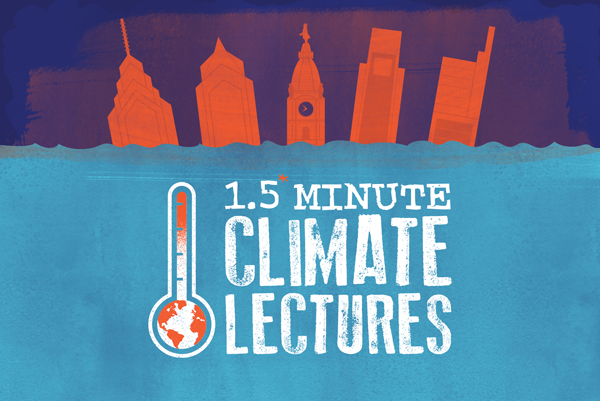1.5 Minute Climate Lectures: Student Perspectives
1.5 Minute Climate Lectures: Student Perspectives
Jacob Hershman, C'20
Fossil Free Penn
Vyshnavi Kosigishroff, C'22
Student Sustainability Association at Penn
1.5 Minute Climate Lectures to sound the alarm about the climate emergency, to call for large-scale climate action, and to share a vision of constructive and comprehensive response.

Jacob Hershman, C'20
Fossil Free Penn
Vyshnavi Kosigishroff, C'22
Student Sustainability Association at Penn
Paul Sniegowski, Stephen A. Levin Family Dean of the College of Arts & Sciences and Professor of Biology
Simon Richter, Class of 1942 Endowed Term Professor in the Department of Germanic Languages and Literatures
Simon Richter, Class of 1942 Endowed Term Professor in the Department of Germanic Languages and Literatures
Brea Watkins, C'22 and Kimberlie Dupiton, C'22
Brenda Casper, Professor of Biology
Christopher Carlson, C'20 and Bonnie Mendelson, C'20
Faculty and students from across the University of Pennsylvania unite in a series of 1.5 Minute Climate Lectures to sound the alarm about the climate emergency, to call for large-scale climate action, and to share a vision of constructive and comprehensive response. The maximum amount the average temperature can rise in order to avoid the worst consequences of global warming is 1.5°C. We’re already past 1°C.
Paul Saint-Amour
Walter H. and Leonore C. Annenberg Professor in the Humanities and Chair of English
Faculty and students from across the University of Pennsylvania unite in a series of 1.5 Minute Climate Lectures to sound the alarm about the climate emergency, to call for large-scale climate action, and to share a vision of constructive and comprehensive response. The maximum amount the average temperature can rise in order to avoid the worst consequences of global warming is 1.5°C. We’re already past 1°C.
Nikhil Anand
Associate Professor of Anthropology
Faculty and students from across the University of Pennsylvania unite in a series of 1.5 Minute Climate Lectures to sound the alarm about the climate emergency, to call for large-scale climate action, and to share a vision of constructive and comprehensive response. The maximum amount the average temperature can rise in order to avoid the worst consequences of global warming is 1.5°C. We’re already past 1°C.
Herman Beavers
Professor of English and Africana Studies
Faculty and students from across the University of Pennsylvania unite in a series of 1.5 Minute Climate Lectures to sound the alarm about the climate emergency, to call for large-scale climate action, and to share a vision of constructive and comprehensive response. The maximum amount the average temperature can rise in order to avoid the worst consequences of global warming is 1.5°C. We’re already past 1°C.
Mark Alan Hughes
Professor of Practice
Faculty Director, Kleinman Center for Energy Policy
Faculty and students from across the University of Pennsylvania unite in a series of 1.5 Minute Climate Lectures to sound the alarm about the climate emergency, to call for large-scale climate action, and to share a vision of constructive and comprehensive response. The maximum amount the average temperature can rise in order to avoid the worst consequences of global warming is 1.5°C. We’re already past 1°C.
Gary Bernstein
Reese W. Flower Professor of Astronomy and Astrophysics
Faculty and students from across the University of Pennsylvania unite in a series of 1.5 Minute Climate Lectures to sound the alarm about the climate emergency, to call for large-scale climate action, and to share a vision of constructive and comprehensive response. The maximum amount the average temperature can rise in order to avoid the worst consequences of global warming is 1.5°C. We’re already past 1°C.
Bethany Wiggin
Associate Professor of Germanic Languages and Literatures Director, Penn Program in Environmental Humanities
Lucy Corlett, C’20
April Anson, Mellon Postdoctoral Fellow, Penn Program in Environmental Humanities
Grace Boroughs, C'20
Meg Arenberg, Managing Director, Penn Program in Environmental Humanities
Margaret Janz, Scholarly Communication and Data Curation Librarian, Penn Libraries